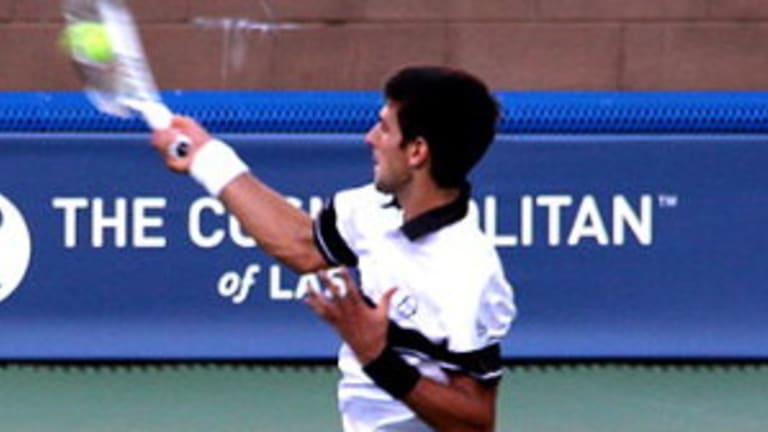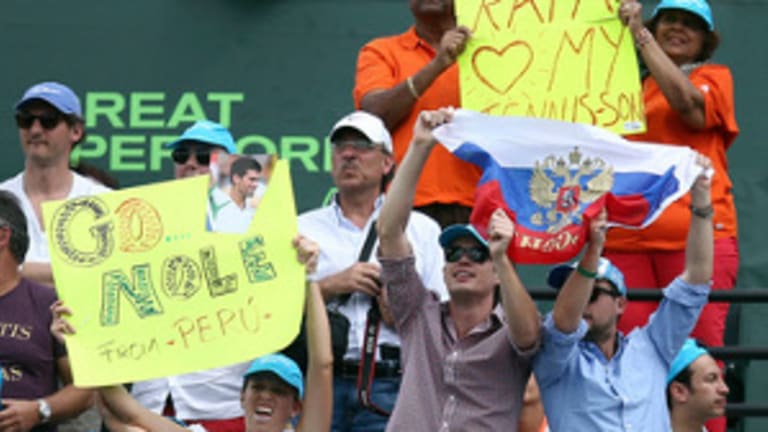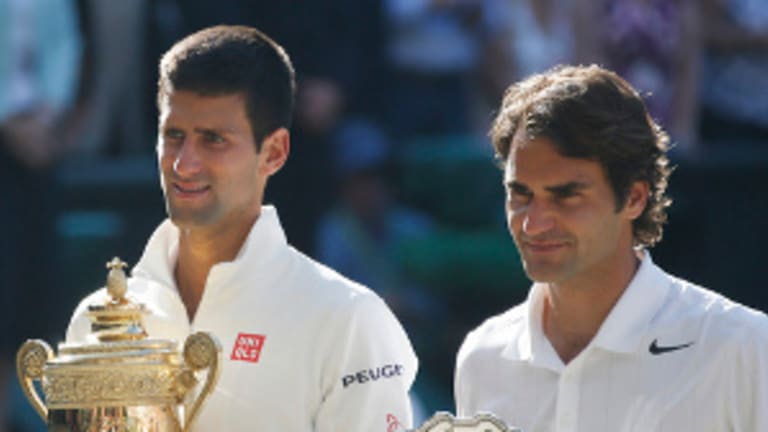With Novak Djokovic set to play his first match as a married man—and the 2014 Wimbledon champion—today in Toronto, the time seems right to talk with a member of the Nole fan family. Today I discuss Djokovic's appeal with Matt Kriz, a Ph.D. student in English at the University of Calgary and regular tennis player. During big tournaments, you can find him commenting @SecondServeHack.
Fan Club: Novak Djokovic
By Steve Tignor Aug 06, 2014French veteran Gasquet reaches Monte Carlo Masters second round
By Associated Press Apr 06, 2025Social
Carlos Alcaraz and Novak Djokovic practice together at Monte Carlo Masters
By Baseline Staff Apr 06, 2025Pick of the Day
Charleston Betting Preview: Sofia Kenin vs. Jessica Pegula
By Zachary Cohen Apr 06, 2025Tennis.com Interview
Brad Gilbert, Patrick McEnroe weigh in on U.S. men's tennis evolution
By Pete Bodo Apr 05, 2025WTA Charleston, USA
Jessica Pegula hails women’s sports, all-American Charleston final
By David Kane Apr 05, 2025Betting Central
Charleston Betting Preview: Ekaterina Alexandrova vs. Jessica Pegula
By Zachary Cohen Apr 05, 2025The Tennis Traveler
Billie Jean King Cup Qualifiers takes us across six countries, three continents and three different surfaces
By Liya Davidov Apr 05, 2025Your Game
Shoe Review: Adidas Ubersonic 5
By Jon Levey Apr 05, 2025Lifestyle
Jack Draper named global Burberry ambassador
By Baseline Staff Apr 05, 2025Fan Club: Novak Djokovic
Talking about the appeal of the world No. 1.
Published Aug 06, 2014
Advertising
From what you said to me, you were up and cheering in your living room when Novak Djokovic won the final point at Wimbledon this year. Novak could probably have used you inside Centre Court that day. He had his fans, but his opponent, Roger Federer, obviously had many more. Unfortunately for him, this seems to have been Djokovic's fate from the start. He came along in the wake of two of the best and most popular players ever, Federer and Rafael Nadal, and he has had to take his support where he can find it.
We'll get into Djokovic's relationship with the tennis audience later. For now, I want to ask you how you came to be a fan of his. Do you recall first seeing him play, and what do you think it is that makes you root for him?
In my case, I was drawn in, accidentally, by his game. At the U.S. Open many years ago, I went out a side court to watch a young and already wild Gael Monfils. I had no idea who his even-younger Serbian opponent was, but as the match progressed, I found myself forgetting about Monfils and his antics, and watching more and more of Djokovic and his shot-making. It was pretty easy to see, as he pounded forehand after forehand, that he was the real thing game-wise. But it wasn't clear if that was true, fitness-wise. At a certain point in the fifth set, Djokovic couldn't breathe, so he simply walked off the court and sat down. Yet—and this was the truest sign of things to come for both Novak and Gael—he still won.

Fan Club: Novak Djokovic
Advertising
Strangely enough, I came to Djokovic fandom quite late. Living in Canada, tennis had already been, until quite recently, a tertiary sport, and while I've been a fan for as long as I can remember, I can't say I followed it that closely until really the late 2000s. That's when I started playing tennis more seriously and when it became a much larger part of my life. But it wasn't until the 2010 U.S. Open that I truly became a Djokovic devotee.
As such, I can't tell you the first time I watched Djokovic; it was probably as early as 2008, but which match or where I don't recall. But I can tell you exactly when I became his fan, and I haven't wavered since. It was when he beat Federer from two match points down to win that Open semifinal in 2010 (he did the same thing the next year). I remember being astounded with the sheer force of his hitting, and I distinctly remember him saying, in the on-court interview after the match, that he saved the match points by "closing my eyes and hitting my forehand as fast as I can." He said it quite sheepishly, and there was something in the way he said it, contrasted with the audacity of playing in such a way at such an important moment, that really took me in. Considering what would happen soon afterwards it may have seemed like I jumped on the bandwagon, but it was really this moment that made me a Djokovic fan in the way I had never been of any player before.
It's also interesting that you mentioned being attracted to Djokovic's game, because one complaint we sometimes hear about Djokovic is that he is somehow mechanical. Certainly there's something in his personality that has drawn me to him, but I also happen to love the way he plays tennis: Those "tomahawk" forehands and blistering, down-the-line backhands. Djokovic is known for his defense, but it's his offensive game that has always impressed me most. For this reason, I've always felt he was somewhat unfairly labeled as a defensive player. I know that Federer, whenever he faces Djokovic, makes a point of saying they both will be trying to step into the court and take control of the points. What do you make of that assessment?
I've never seen Djokovic as mechanical or workmanlike, but as clean, efficient, sleek at his best, and a pretty amazing example of flexibility and athleticism. His game doesn't have frills or extra notes of flair, but I like that fact as well, and watching him use both corners of the court with both ground strokes is artistic enough for me. I also think you're right—he obviously plays defense well, but Djokovic isn't a retriever; like Nadal, what he's really good at is creating offense out of defense. Maybe trying to play the game yourself gives you a better appreciation of just how good he is.
So you liked the contrast between Djokovic's risk-it-all approach on those shots and the sheepish way he talked about them? There's certainly a human quality to him when he competes. His frustration and need to vent is familiar to every player, and like every player, he can let negativity get the better of him. At least publicly, he has also raised the bar as far as how he reacts to losses. It seems, no matter how unhappy he is about a defeat, that he can always produce a smile and an embrace for the player who beat him, and he's one of the few players who will applaud an opponent's good shot even when he's behind in the score. I should also say that, in my few one-on-one dealings with him, Djokovic has been the most personable of the game's star players, and he has become much more patient (some would say boring) in press conferences over the years.
As far as his fan base goes, he's obviously known for a strong following among Serbs. You're Canadian, but you’ve told me you have an Eastern European background. Do you think you relate to something about him in that way? And do you see any reason why he may not have been completely embraced by the tennis audience at large so far? He obviously has their respect, but he often seems to come off as second favorite on court, even when he isn’t playing Rafa or Rog. I'm thinking, for example, of Djokovic’s matches at Wimbledon the last two years against Juan Martin Del Potro and Radek Stepanek.
Advertising

Fan Club: Novak Djokovic
© AP
The question of Djokovic's relative unpopularity is a perplexing one. As a natural contrarian, it doesn't particularly bother me that he's not everybody's favorite player, as Federer is here, but it does irk me a little how often I hear people express their distaste or even contempt for him. I both get it and don't get it. I understand that certain things about him can be off-putting, like the shirt ripping, or the Cro-Magnon roar; it can come off as brutish in a sport that tries to project an image of refinement. Yet, as you said, Djokovic has this very human quality to him. He gets too upset with himself, too concerned with the crowd—though it is hard to imagine a crowd cheering for Stepanek against Federer, so you can see the frustration he might feel—but these moments, along with his near unparalleled sportsmanship, seem very genuine.
It seems, though, that many people can't get past the moments of brashness. While I was watching the Wimbledon final I was texting back and forth with my cousins, who know I'm a big Djokovic fan, and they were openly rooting against him, more so than rooting for Federer. Much like Djokovic that day, I was feeling a little alone in the world.
To answer your other question, regarding my Eastern European background and its role in my identification with Djokovic, I think there is something to it, and it has something to do with this feeling of always being an outsider. I am literally Eastern European in name only. My paternal grandfather was born in the Czech Republic but immigrated to Canada when he was 5, and my only real connection to the "homeland"—my great-grandmother—passed away more than 10 years ago. I can't legitimately claim to be anything other than Canadian, but I have found myself, more and more as I grow older, identifying with the outsider's perspective that Eastern Europeans often have (coincidentally, I recently played a singles match against a Czech player who most people find off-putting; he and I immediately hit it off). I don't know if it has to do with my heritage, but I suspect it does.
The interesting thing about those in the outsider role is—if I can wear my academic hat for a moment—those who are on the inside are quite fine with them as long as those outsiders know their place. This is why players like Stepanek, who plays the slightly exotic but mostly harmless clown role, and Del Potro, who is always deferential and humble, like a good servant, may be more acceptable outsiders. Ultimately they’re unthreatening; they know their place. Whereas Djokovic, while he can be both deferential and clownish, seems to not know his place. He’s therefore threatening, and people tend to project negativity towards that which threatens them.
How’s that for a cynical outsider’s perspective?
Advertising
I don't think it's cynical; I think there's something to your outsider theory when it comes to Djokovic, and to Eastern Europeans in tennis in general. Ivan Lendl and Martina Navratilova, to name two of your fellow Czechs, were Communist-era defectors who embraced the USA, yet they were cast as the villains in the States. Monica Seles and Maria Sharapova became thoroughly Americanized. Ilie Nastase of Romania played the clown, of course, but he also had an outsider's keen sense of being disrespected. He used to badger chair umpires not to refer to him simply as "Nastase," but as "Mr. Nastase"—of course, when one of them finally did give in, he lorded it over him the rest of the match and pretended that the ump was his servant.
With Djokovic, I think he still suffers a little from the “you never get a second chance to make a first impression” syndrome. People still remember the "brash" young Nole with the equally brash parents, who had a habit of pulling the plug on matches early. And like Lendl in the early 80s, he has been trying to muscle in on a golden rivalry. Then it was between Borg and McEnroe; this time it was between Nadal and Federer. Djokovic may always have too rough an edge for tennis types; I've found myself wondering this year if Grigor Dimitrov, a Bulgarian who comes across as a Federer-esque citizen of the world, could be a breakthrough on that front. Do you see Djokovic becoming more popular as he ages, the way most great tennis players do?
Finally, what it has been like to be a Djokovic fan over the years? Until 2011, you might not have expected him to pass Nadal and Federer in the rankings and assume the role of a No. 1 player. What has it been like since, now that he has raised those expectations? He's riding high again at the moment, but there have been tough losses in Grand Slam finals over the last three years. Sometimes I want to tell him, just relax, don't get so emotional; he succeeded in controlling himself in the Wimbledon final, and look what happened. But if he didn't go a little crazy, and beat his chest and let out a primal roar or two, that wouldn't be Nole, would it? I think it can be especially tough to see him not play well, because when he’s good—like, third-set-of-2014-Rome-final-against-Nadal good—sometimes I wonder if anyone in the game's history could have hung with him.

Fan Club: Novak Djokovic
© AP
Advertising
I think we all might wish for another Nastase at times (I am just now imagining Fabio Fognini insisting that chair umpires call him "Mr. Fognini..."), and I do wonder if Djokovic might have won more fans had he embraced more of a villain role. A sort of, "I'm going to stomp all over your 'golden era' and just try to stop me" position, but it's probably not who he is. He's the number one player in the world and he wants to be loved like the other No. 1 players have been. I wish at times that he would just let it go, but then again he must be wondering how long he will have to pay penance for those brash early years. Why, he might be thinking, do we still have to talk about those match retirements and exaggerated bravado? Why, for example, do we not still question Federer for being a notorious hot head in his early years? Why are Nadal's at times absurdly exuberant displays of emotion seen only as a sign of his incredible intensity? If you're Djokovic, you would have to wonder about all this.
I do think the public perception of Djokovic has changed over the last few years, however, and I do think the respect he garners will only increase as he ages, but I tend to believe he'll be seen more as a "legend of the game" than universally beloved figure. I also think that as long as he's still preventing Federer or Nadal from achieving even greater levels of success—as with this year's Wimbledon—or even acting as an impenetrable barrier that a figure like Dimitrov is unable to break through, he will for many be viewed as the accursed "other guy." But I think for him to be more loved he will actually have to become a once-dominant figure. Look at Lleyton Hewitt and the way he's admired now and consider how his rather prickly character was anything but admired when he was on top of the game.
To answer your final question, I find myself somehow quoting Woody Allen and saying "to love is to suffer," because I think it most accurately describes the Djokovic experience. The 2011 season was certainly an exception, but for the most part a Djokovic year is one that’s usually filled with examples of tennis at almost unfathomable levels—witness some of his recent decimations of Nadal—followed by inexplicably listless performances.
The unfortunate part has been that much of that listlessness has come in Grand Slam finals. I remember saying before Wimbledon that Djokovic was the absolute favorite to make the final, but that I'd be wary to pick him to win once he got there. His previous two finals appearances had been especially puzzling: In the U.S. Open final last year, it felt like he went into it believing he'd lose; at Roland Garros this year, with Nadal looking like this time he believed he would lose, Djokovic basically handed the match back to him. At that point I was beginning to wonder if he'd ever win a Grand Slam again, and then Wimbledon happened. I think it was key that he played Federer, as the two of them seem to enjoy spoiling the other one's potentially golden moments, but maybe it was as simple as he was due.
Whatever the case, if the Roland Garros final was the lowest of lows, the Wimbledon one was the highest of highs, and as a suffering Djokovic fan I probably wouldn't want it any other way.